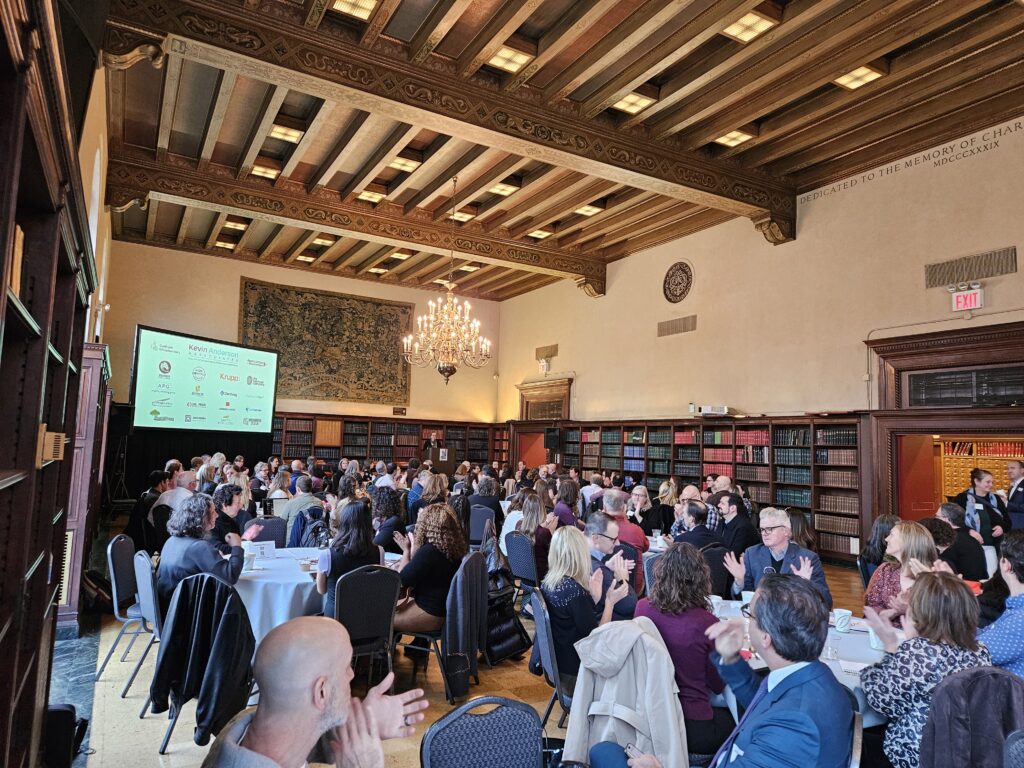If you went to this week’s Gathering of the Ghosts conference and haven’t started using GenAI apps in your ghostwriting work, advice from the expert panelists should have been enough to convince you: just do it.
Writers who ignore AI do so at their own peril. “AI isn’t going to take your job, but someone who knows how to use AI could take it,” said Jonathan Segura, senior vice president and editorial director at Publishers Weekly.
Problems and ethical and legal concerns with AI abound. But it hasn’t stopped experienced ghostwriters from experimenting with the technology—or embracing it altogether. That much was clear from panelists who spoke at the second annual conference dedicated to bringing ghostwriters out of the shadows.

Close to 200 ghostwriters, literary agents, publishers, and publicists attended the two-day event, which took place at the New York Academy of Medicine, in Manhattan. The conference is cosponsored by Gotham Ghostwriters, a New York agency that plays matchmaker between authors and ghostwriters, and the Association of Ghostwriters. ASJA partnered with Gotham Ghostwriters on the 2025 Andy Awards for excellence in nonfiction book collaboration, which were announced at the event. See the winners and finalists here.
AI Is an Opportunity and a Threat
The dichotomy that AI tools like ChatGPT and Claude represent was apparent from discussions in two sessions devoted to using AI in ghostwriting projects and the results of a just published report on AI and writing from Gotham Ghostwriters and expert collaborative writer Josh Bernoff.
Sixty-eight percent of ghostwriters use AI at least some of the time, a higher proportion than writers in general (61%), according to the “AI and the Writing Profession Study.” However, of the dozen types of writers included in the survey, book ghostwriters were among the least likely to call themselves advanced AI users. Only 11% used that description v. 40% who consider themselves AI “dabblers” and 31% who self-report as “nonusers.”
Download the full AI and writing report here. Bernoff will present a webinar on findings customized to ASJA members sometimes in early 2026 – stay tuned for details.
If you don’t use AI apps yet, panelists suggested starting small, using them for tasks that add relatively little value for the amount of time they take, such as transcribing interviews, research, or brainstorming titles or subtitles. Panelists extolled the virtue of using GenAI tools to summarize academic journal articles or other dense background material that you might need to cite in a book or report. If you’re using AI for research, though, fact check every single thing to make sure it’s accurate.
Other ghostwriters use AI to do research on potential clients before having an initial meeting. Bernoff called AI-based client due diligence “cheating, but really good cheating. It’s helping you do your homework before you talk.”
To a person, ghosts who use AI said the one thing they don’t use it to do is write. “It’s incredibly bland, uses cliches, is full of corporate jargon, and uses words that I put in ‘word jail,’” said Katia Walsh, co-author of “Winning with AI: The 90-Day Blueprint for Success,” to be published in early 2026, and former chief digital officer at Harvard Business School.
Think of AI as the assistant you always wanted but didn’t think was possible to find, said Michael Long, a ghostwriter, speechwriter, screenwriter, and writing lecturer at Georgetown University. “It’s a brilliant literalist. The key to success is telling it exactly what you want. Everything you leave out will be filled in with blandness,” Long said. If you’re asking it to write an outline, for example, use prompts like: use active voice and don’t use adverbs, Long said. Get around hallucinations by asking “Are you sure” and asking for links to sources.
AI’s benefits don’t outweigh the fact that AI apps have been illegally trained on books without the authors’ consent, and if the industry doesn’t do a better job of putting up walls to prevent that from happening in the future there might not be a future, said Mary Rasenberger, CEO of the Authors Guild, and a former lawyer and expert in copyright and media law.
“If we don’t succeed, there’s going to be a diminishment of the publishing industry. The markets will be flooded with AI-generated books,” Rasenberger said. “There’s always going to be a market for celebrity books, books by brand name authors, but it’ll be a tighter market especially if we don’t put up licensing.”
Other Top Gathering of the Ghosts Conference Takeaways
Some of the other major takeaways from the conference:
The overview makes or breaks a book proposal. For writers who ghostwrite book proposals, a book proposal’s overview section is one of, if not the most important elements, according to a panel of agents who rep nonfiction book authors.
The overview should be two to three pages and explain what the book is about, why it’s timely and important, who’s writing it, and what makes them qualified to write it. Agents also agreed that the overview should be written in the same voice or tone as the book, since it’s the first sample of the writing that an agent or publisher will see.
Agents don’t agree on what constitutes the ideal book proposal. Aside from the overview, agents’ takes on other parts of a book proposal differ. The ideal length? There isn’t one. The consensus was somewhere between 30 to 50 pages, including a chapter outline and sample chapter. Some agents said not including a sample chapter is okay in certain circumstances. They disagreed on the need for a proposal to include comps – an analysis of existing books on the same or adjacent topics – since many literary agencies have in-house departments that can pull better data than a ghostwriter could.
Agents’ opinions also diverge on the importance of the query or pitch letter that authors send before submitting a proposal. Some only look at a book proposal if the pitch letter that precedes it is well-written. Others said they didn’t pay attention to pitch letters. Most said an author has to have a platform of some kind to be attractive to an agent or publisher. The specific platform depends on the situation, including where potential readers congregate.
Collaboration styles are all over the map. Successful ghostwriters are flexible and pragmatic. They warn against telling prospective clients “This is how I work” because if it’s not how the person wants or likes to work, it could be a reason for them not to hire you.
For the most part, they agree that the author and project dictate the process. Some spend hours talking to an author before starting on-the-record interviews. Some do all the research first before starting to write, while others research and write a book chapter by chapter (which works best when chapters cover distinct topics). Some conduct interviews in person, others over Zoom. Almost all ghosts who talked at GOTG record interviews—many use 2 recording devices, their phone and a recorder. Most use AI transcription services, though some like to transcribe interviews themselves because it helps them pick up the author’s voice.
Capturing a subject’s voice is a ghostwriter’s job one. Voice, voice, voice. Aside from AI, a common thread in panels and sessions was the need for a ghostwriter to capture the author’s voice. Based on the experiences that ghostwriters, agents, and authors who’ve worked with ghostwriters shared, there’s no one way to do that. Some techniques that were mentioned:
- Build trust by spending time talking before starting the actual work, so conversations feel natural and the author feels comfortable opening up
- Read existing material that the author has written or listen to interviews they’ve done
- Listen to recordings of your own interviews. Even if you’re using a transcription service, hearing how the person talks can make writing in their voice second nature.
- Don’t obsess about it. One ghostwriter said they spend more time making sure the prose is clear and understandable and sprinkling in voice as needed.
Multiple reviewers make projects harder—and turn ghostwriters into good project managers. Several conference panelists commiserated about how much harder projects can be when multiple people are reviewing drafts and providing feedback – whether it’s a CEO and their spouse or a C-suite executive and their comms team.
Ghostwriters who do corporate work deal with this situation all the time—and they develop the diplomacy and project management skills to show for it. Remember to promote those skills in your LinkedIn profile and in other marketing, and when you’re pitching prospective clients for book or non-book ghostwriting work.
Michelle Rafter is a Portland, Oregon, ghostwriter specializing in business and thought leadership books, reports, and other content. She wrote ASJA’s free e-book, “Building an Independent Writing Business,” is ASJA publications chair, represents ASJA on the Andy Awards committee, and chaired the 2023 ASJA conference.
Browse Articles
Topic
Book Publishing, Craft & Writing Skills, Ghostwriting

